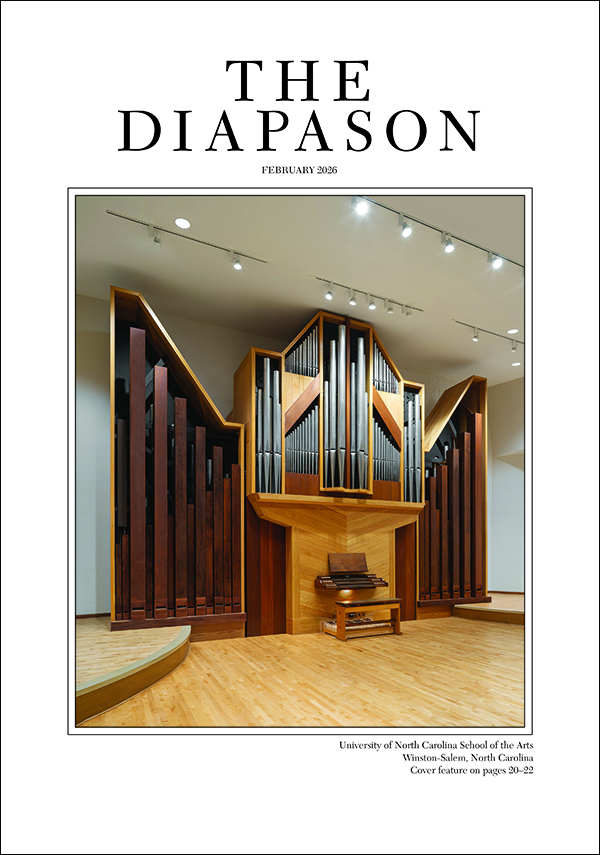
2019 East Texas Pipe Organ Festival features a harpsichordist
The genial genius who founded and organizes the annual East Texas Pipe Organ Festival in Kilgore, Texas, engaged a brilliant young artist to present a recital on Wednesday, November 13, as the first music on what happened to be my birthday. John Walthausen, a name new to me, opened the musical festivities of this mid-festival day with a splendid recital, the first half of which was played on my 1987 Willard Martin Saxon double instrument. When Lorenz Maycher telephoned to ask if I knew of an available German-style instrument I responded, “Yes, I was intimately familiar with an owner, and, yes, I would be happy to loan it to the festival for the recital.” Since a tornado had rocked the part of Dallas in which I live several weeks earlier causing immense damages tallied in the millions of dollars—including some lesser but still dramatic ones to my house—I had not intended to travel in November, but the harpsichord addition to the program as well as a Harold Lloyd silent movie to end that Wednesday schedule roused my interest, and I had decided, with the transportation help of a kind neighbor, to spend that one day in the organ capital of East Texas.
It was a pleasure to hear such a well-chosen program that the artist began by playing a magnificent rendition of J. S. Bach’s Chromatic Fantasy and Fugue in D Minor. It was a performance that I believe might have been greeted with favor by Isolde Ahlgrimm (what higher praise could I offer?). Following that work with Polonaise in C Minor by Wilhelm Friedemann Bach and two sonatas in D major by Domenico Scarlatti (K. 490, Cantabile, and K. 119, Allegro)—with superb control of the fiendishly difficult cross-hand top-of-the-keyboard notes—made for an exciting and jubilant conclusion to the first half of the concert.
Equally masterful was the ensuing organ half of the program, played on Roy Perry’s own instrument, Aeolian-Skinner Organ Company Opus 1173. It was thoughtful programming to follow the all-Baroque first half with an all-Romantic second half: Prelude and Fugue in G Minor by Brahms, two of the Sketches for the Pedal-Piano, opus 58, by Schumann, and a completely masterful rendition of Liszt’s magnum opus, Variations on Weinen, Klagen, Sorgen Zagen.
I was especially delighted to learn that the New York-born Walthausen was a fellow Oberlin alumnus (2011, only fifty-one years after I graduated) who furthered his education at the Conservatoire National Supérieur de Paris, studying organ with Olivier Latry and Michel Bouvard, following that with a master’s degree in historical performance from the Schola Cantorum of Basel, Switzerland, where he studied harpsichord with Jörg-Andreas Bötticher and organ with Lorenzo Ghielmi. An amazingly widespread series of concerts performed all over the world followed for Walthausen, including a year in Japan as organist in residence at the Sapporo Concert Hall in Hokkaido. He is currently organist and choirmaster of St. Andrew’s Episcopal Church in Glenmoore, Pennsylvania. I, for one, look forward immensely to hearing this young artist again—and soon.
John’s inclusion of Friedemann Bach’s composition encouraged me to play through the complete set of twelve such pieces (found in my music library in six folios published as part of the Hausmusik series of the Oesterreichischer Bundesverlag Wien, on paper now as old as I am it seems, and equally crumbling, perhaps). Among these, several seem more suited to the fortepiano, but a goodly number of the earlier and shorter pieces sound wonderful on the harpsichord, and I encourage their inclusion in future recitals, both by John and the rest of us in the harpsichord community.
2019 Harpsichord Notes: topics and page numbers
January, page 8: Harpsichord Notes in The Diapason: A bit of history
February, pages 12–13: Jane Clark: “D’un goût nouveau:” The influence of Evaristo Gherardi’s Théâtre Italien in Francois Couperin’s Pièces de Clavecin
March, page 11: A fascinating book by Beverly Jerold, Music Performance Issues 1600–1800
April, pages 12–13: The Diapason Harpsichord columns in history part 2: front-page features
May, page 11: CD review of Le Clavecin Mythologique; A major instrument collection (Hatchlands, Surrey, UK) and Claire Hammett
June, page 11: The Cambridge Companion to the Harpsichord; Replica of George Washington’s harpsichord returns its sounds to Mount Vernon
July, page 11: Scarlatti’s Cat in London, Vienna, and Texas
August, page 11: From A to Z Harpsichord Notes: A duo and The Harpsichord Diaries; Twentieth-century harpsichord concertos; One Hundred Miracles by Zuzana Ru˚žicˇková (with Wendy Holden)
September, page 11: Program planning
October, page 13: Celebrating Herbert Howells
November, pages 12–13: Giving thanks from A to Z, part 1
December, page 11: Giving thanks from A to Z, part 2.
§
As we begin another year I have several questions for our readers. 1) Have any of you played one or more of the Friedemann Bach polonaises? 2) Does anyone know of a pedal harpsichord for sale (a separate unit with an organ-like pedalboard that is placed beneath the regular harpsichord comprising one or two manuals—the pedal unit consisting of independent registers? John Challis built several of these, most famously one for E. Power Biggs, and I am seeking such an instrument for a current student of mine). Meanwhile, best wishes for an exciting 2020 and the many musical adventures that surely lie before us during the coming months.

